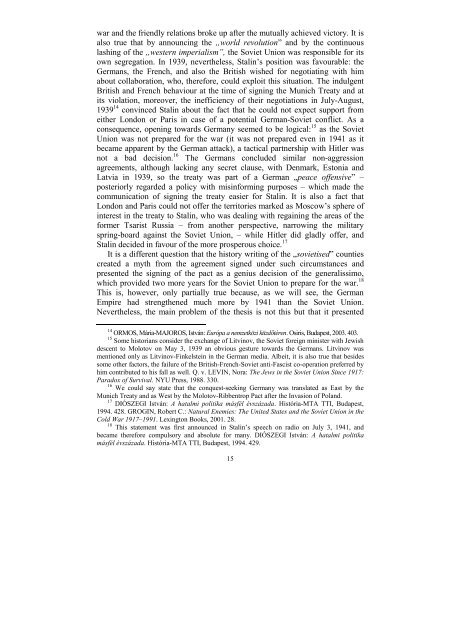The Molotov-Ribbentrop Pact - ELTE BTK Történelem Szakos Portál
The Molotov-Ribbentrop Pact - ELTE BTK Történelem Szakos Portál
The Molotov-Ribbentrop Pact - ELTE BTK Történelem Szakos Portál
Create successful ePaper yourself
Turn your PDF publications into a flip-book with our unique Google optimized e-Paper software.
war and the friendly relations broke up after the mutually achieved victory. It is<br />
also true that by announcing the „world revolution” and by the continuous<br />
lashing of the „western imperialism”, the Soviet Union was responsible for its<br />
own segregation. In 1939, nevertheless, Stalin’s position was favourable: the<br />
Germans, the French, and also the British wished for negotiating with him<br />
about collaboration, who, therefore, could exploit this situation. <strong>The</strong> indulgent<br />
British and French behaviour at the time of signing the Munich Treaty and at<br />
its violation, moreover, the inefficiency of their negotiations in July-August,<br />
1939 14 convinced Stalin about the fact that he could not expect support from<br />
either London or Paris in case of a potential German-Soviet conflict. As a<br />
consequence, opening towards Germany seemed to be logical: 15 as the Soviet<br />
Union was not prepared for the war (it was not prepared even in 1941 as it<br />
became apparent by the German attack), a tactical partnership with Hitler was<br />
not a bad decision. 16 <strong>The</strong> Germans concluded similar non-aggression<br />
agreements, although lacking any secret clause, with Denmark, Estonia and<br />
Latvia in 1939, so the treaty was part of a German „peace offensive” –<br />
posteriorly regarded a policy with misinforming purposes – which made the<br />
communication of signing the treaty easier for Stalin. It is also a fact that<br />
London and Paris could not offer the territories marked as Moscow’s sphere of<br />
interest in the treaty to Stalin, who was dealing with regaining the areas of the<br />
former Tsarist Russia – from another perspective, narrowing the military<br />
spring-board against the Soviet Union, – while Hitler did gladly offer, and<br />
Stalin decided in favour of the more prosperous choice. 17<br />
It is a different question that the history writing of the „sovietised” counties<br />
created a myth from the agreement signed under such circumstances and<br />
presented the signing of the pact as a genius decision of the generalissimo,<br />
which provided two more years for the Soviet Union to prepare for the war. 18<br />
This is, however, only partially true because, as we will see, the German<br />
Empire had strengthened much more by 1941 than the Soviet Union.<br />
Nevertheless, the main problem of the thesis is not this but that it presented<br />
14 ORMOS, Mária-MAJOROS, István: Európa a nemzetközi küzdőtéren. Osiris, Budapest, 2003. 403.<br />
15 Some historians consider the exchange of Litvinov, the Soviet foreign minister with Jewish<br />
descent to <strong>Molotov</strong> on May 3, 1939 an obvious gesture towards the Germans. Litvinov was<br />
mentioned only as Litvinov-Finkelstein in the German media. Albeit, it is also true that besides<br />
some other factors, the failure of the British-French-Soviet anti-Fascist co-operation preferred by<br />
him contributed to his fall as well. Q. v. LEVIN, Nora: <strong>The</strong> Jews in the Soviet Union Since 1917:<br />
Paradox of Survival. NYU Press, 1988. 330.<br />
16 We could say state that the conquest-seeking Germany was translated as East by the<br />
Munich Treaty and as West by the <strong>Molotov</strong>-<strong>Ribbentrop</strong> <strong>Pact</strong> after the Invasion of Poland.<br />
17 DIÓSZEGI István: A hatalmi politika másfél évszázada. História-MTA TTI, Budapest,<br />
1994. 428. GROGIN, Robert C.: Natural Enemies: <strong>The</strong> United States and the Soviet Union in the<br />
Cold War 1917–1991. Lexington Books, 2001. 28.<br />
18 This statement was first announced in Stalin’s speech on radio on July 3, 1941, and<br />
became therefore compulsory and absolute for many. DIÓSZEGI István: A hatalmi politika<br />
másfél évszázada. História-MTA TTI, Budapest, 1994. 429.<br />
15













